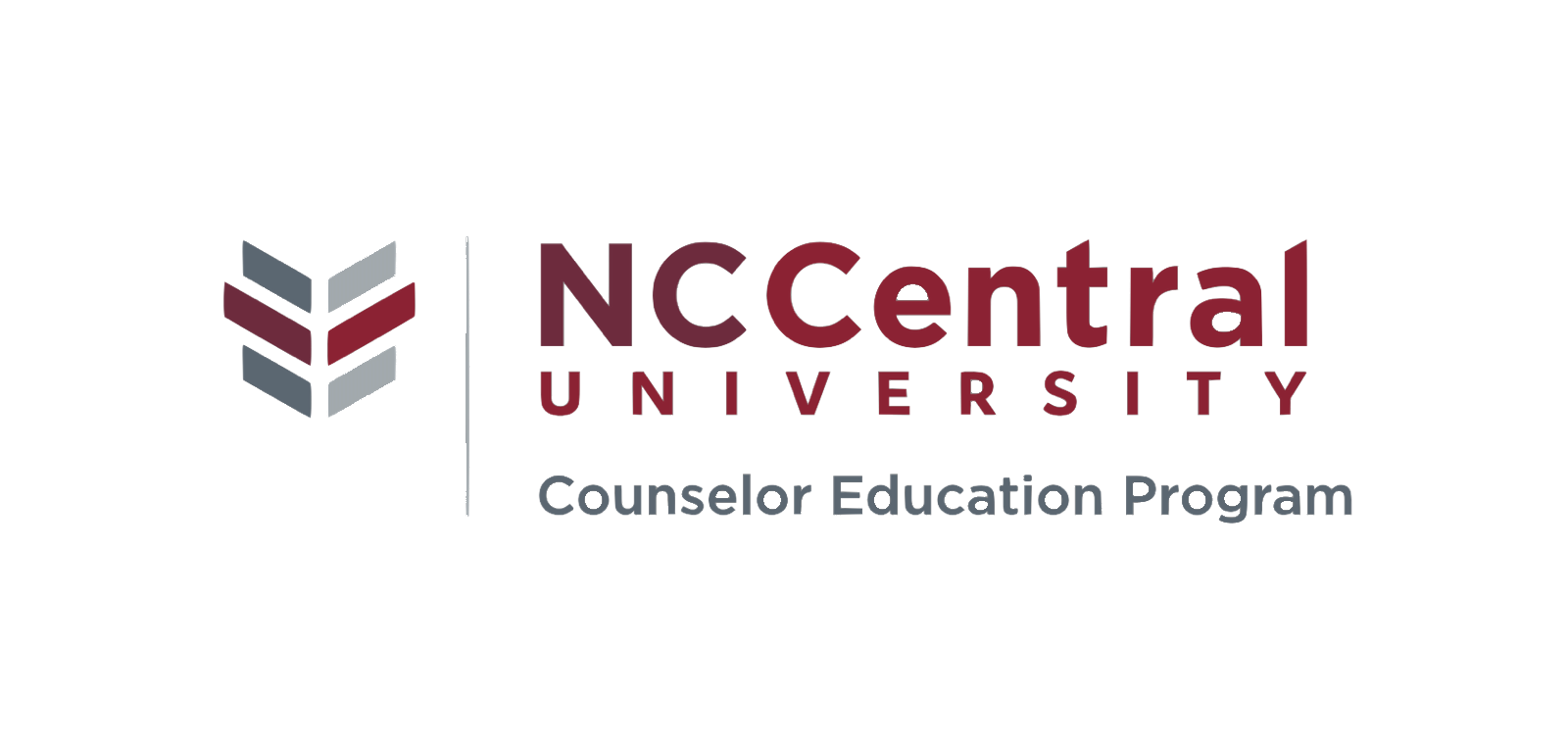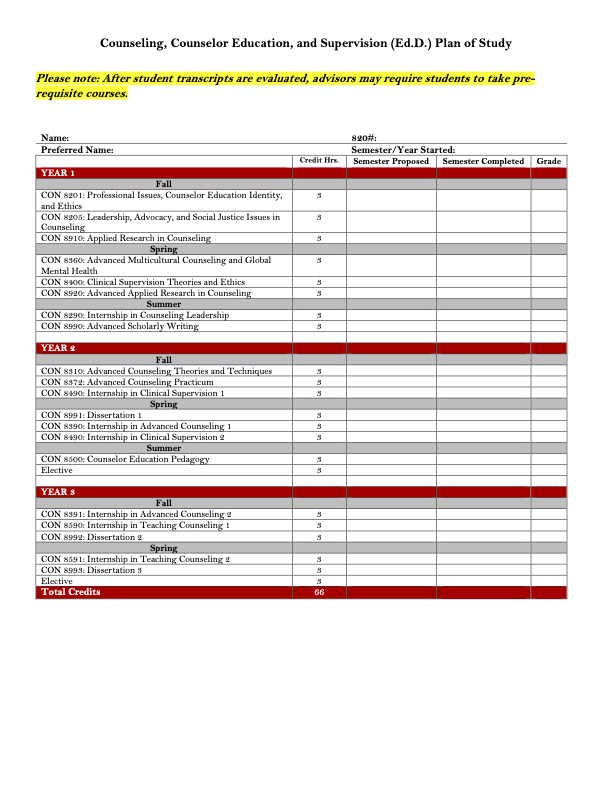Counseling, Counselor Education, and Supervisionn (Ed.D.) Plan of Study
Courses and Course Descriptions
Doctoral level coursework is very different from Masters level courses. The student is expected to be more of an independent learner. Most of the classes are seminars where the students have responsibility for generating lectures/discussions, etc. A seminar tends to focus on more advanced and/or specific research topics. It has few, if any, lectures and emphasizes student presentations, papers, and research. In a typical doctoral seminar, the instructor assigns papers which the students read during the week, and then present and discuss with other students during class, with the instructor moderating the discussion.
Course Number |
Course Name |
Course Description |
|
CON 8201 |
Professional Issues, Counselor Education Identity, and Ethics |
This advanced seminar introduces doctoral students to the doctoral program and the foundation of counselor education. This course is designed to explore the roles and responsibilities of counselor educators by addressing professional roles in teaching and mentorship, supervision, research and scholarship, and leadership and advocacy. In addition, students will examine current and emerging professional issues in counselor education and familiarize themselves with the current CACREP standards and code of ethics. |
|
CON 8205 |
Leadership, Advocacy and Social Justice Issues in Counseling |
This course will cover theories and concepts related to leadership and social justice advocacy in the counseling profession. This course is grounded in the study of multicultural and counseling theories that emphasize the social and cultural context and advocacy roles of social justice, multiculturally competent counselors. This course is designed to promote critical self-analysis, cultural understanding, and interpersonal and collective growth through brave and respectful discussions, readings, and assignment. |
|
CON 8290 |
Internship in Counseling Leadership |
This course will engage students in a project related to leading and advocating for mental health services for the under-resourced in North Carolina (urban, suburban or rural) or abroad. |
|
CON 8310 |
Advanced Counseling Theories and Techniques |
In this course, students will engage in advanced study of evidence-based counseling theories and interventions in order to apply research-based treatments that are tailored to meet the needs, preferences, and cultural expectations of clients or students. |
|
CON 8360 |
Advanced Multicultural Counseling & Global Mental Health |
This course will address global mental health needs within the context of multicultural counseling. Global mental health is an evolving field of research and practice that aims to alleviate mental suffering through the prevention, care and treatment of mental and substance use disorders, and to promote and sustain the mental health of individuals and communities locally and around the world. The course will also cover adapting evidence-based practices, interventions, and research for diverse cultural clients. Other topics that will be covered: learning another language (emphasis on mental health/counseling terminology), advocacy, task sharing, diversity, equity and inclusion within the field of counseling. |
|
CON 8372 |
Advanced Counseling Practicum |
Students will work in the field, practicing as a counselor in their desired setting for 100 clock hours, meeting for group supervision with the instructor weekly. |
|
CON 8390 |
Internship in Advanced Counseling I |
Students will work in the field, practicing as a counselor in their desired setting for 300 clock hours, meeting for supervision with the instructor weekly. |
|
CON 8391 |
Internship in Advanced Counseling 2 |
Students will work in the field, practicing as a counselor in their desired setting for 300 clock hours, meeting for supervision with the instructor weekly. |
|
CON 8400 |
Clinical Supervision, Theories & Ethics |
This course will teach the theories and ethics related to clinical supervision in the counseling profession. |
|
CON 8490 |
Internship in Clinical Supervision 1 |
Students will provide individual and/or group supervision of master’s level counseling students in their Practicum and/or Internship. |
|
CON 8491 |
Internship in Clinical Supervision 2 |
Students will provide individual and/or group supervision of master’s level counseling students in their Practicum and/or Internship. |
|
CON 8500 |
Counselor Education Pedagogy |
This course will cover the method and practice of teaching counseling, curriculum design, learning theory, online instruction, and universal course design. |
|
CON 8590 |
Internship in Teaching 1 |
Students will teach a master’s level course within the Counselor Education Program. |
|
CON 8591 |
Internship in Teaching 2 |
Students will teach a master’s level course within the Counselor Education Program. |
|
CON 8910 |
Applied Research in Counseling |
Applied research is a valuable tool in understanding the human mind and behavior. It refers to scientific study and research that seeks to solve practical problems. Thanks to this kind of research, mental health professionals can investigate problems affecting people's daily lives. This kind of research specifically targets real-world issues. The course in Applied Research in Counseling will explore the foundational elements of applied research and problems of counseling practice as well as cover research design (quantitative, qualitative, and mixed methods), quantitative and qualitative data analysis, models and methods of sampling, instrument design, program evaluation, ethics in counseling, and strategies for conducting culturally relevant and culturally competent research. Additionally, students will learn the importance of data literacy in practice and be introduced to the three-article dissertation concept. |
|
CON 8920 |
Advanced Applied Research in Counseling |
This course examines various approaches to research methodology, statistical analysis, and program evaluation in counseling. The methodological focus is on qualitative, quantitative, action research, and evidence- or outcome-based research. Students will develop skills in data collection and basic statistical analysis. Research aimed at improving counseling effectiveness as well as opportunities, challenges, ethics, and legal issues in research and evaluation are considered. By the end of the semester, each student will have had the opportunity to learn and apply the skills needed to evaluate the methodological adequacy of published research and will understand the critical steps in designing and conducting a research project. |
|
CON 8990 |
Advanced Scholarly Writing |
This course will introduce the three-article dissertation design to students. Students will explore and discuss problems of practice in which they are interested in studying and identify relevant peer-reviewed journals. A research proposal and IRB is developed. The course will also cover concepts of program evaluation and grant-writing. |
|
CON 8991 |
Dissertation 1 |
This course is the first in a series of dissertation courses designed to facilitate the three-article dissertation. Dissertation 1 will require a single manuscript to be drafted that includes an extensive review of the literature to justify the significance of the problem, including key conceptual/theoretical underpinnings for the dissertation research as a whole. An IRB is finalized and submitted during Dissertation 1. |
|
CON 8992 |
Dissertation 2 |
This course is the second in a series of dissertation courses designed to facilitate the three-article dissertation. Dissertation II requires students to carry out their research proposal upon IRB approval. Students will then draft a single manuscript that will include a complete research study with methods, results/findings, and implications. The manuscript will be prepared and submitted to a journal for peer-review as the course’s culminating task. |
|
CON 8993 |
Dissertation 3 |
This is the third and final course in a series of dissertation courses designed to facilitate the three-article dissertation. Dissertation III requires students to build upon the first (literature review) and second (research) articles to develop a conceptual manuscript that presents an innovative concept, program, or procedure to address a problem of practice. The manuscript will be prepared and submitted to a journal for peer-review as the course’s culminating task. |

